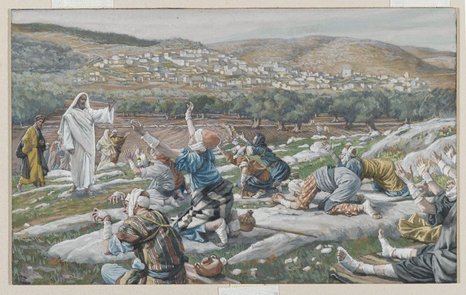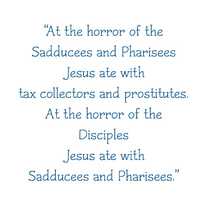Luke 17:11-19 CEB On the 15th of May in the Jungle of Nool, in the heat of the day, in the cool of the pool. He was splashing, enjoying the jungles great joys when Horton the Elephant heard a small noise. The Whos, he heard the Whos. A tiny group of people who lived, of all the precarious places to reside, a dust speck. Not just any dust speck, but a dust speck at the mercy of the wind. As the parents of two young children Linc and I have both read our share of Dr. Seuss. Out of their earshot we have both joked about how the Whos are just asking for it. First, they are at the mercy of the elements as the wind can drop them into a pool or quick sand or a hot steaming kettle of beezlenut oil. Also, they go to war over the silliest things, like whether you like to eat your bread butter side up or butter side down. Finally, they have little regard for their resources. They refused to replant new truffula trees when they cut down their old ones and therefore destroyed their forest. A great question for another day is, IF Horton had known they were inches away from self-annihilation would he have still chosen to save them?  The truth is, Horton had compassion for his dust speck not because they deserved redemption or could give something back to Horton. We can mull over the moral prospects of his choice but it is a non-issue in this case. Horton saw a group of people who needed help and he was going to help them. After all, a person's a person no matter how small. This wasn't an easy choice for Horton. The decision to protect these Whos came at a price. He was ridiculed by his community, he was displaced from his home, and he worked his body to exhaustion while chasing a bird who stole his new friends and carried them across the land. He searched through three million clovers to find them once they were dropped by the bird. Dedication at a price. For Horton, failure was not an option but it was always a possibility.  On the dirt road way, to Jerusalem's home, in the heat of the day, on the path where they roam. He was conversing- with disciples their loves and their joys, when Jesus of Nazareth heard a loud noise. The lepers. He heard 10 lepers to be exact. Off in the distance they cried out to him for help. They lived, forcefully, in the margins. They were unclean and as such had to be separated from those who were considered clean, even if those people were friends and family. It would not have been an uncommon thought to believe God cursed them.  That is how some people unfortunately answered the question: why do bad things happen to good people. They thought, well, because it happened to them that must mean we only thought they were good. If we knew them like God knew them we would learn just how terrible they really were. It was that “they had it coming” argument that left the poor and sick on the margins away from the others. It would have given Jesus a so called reason to ignore the ten people. (At least socially.) No one would have stopped him on the road later to ask, “Why did you ignore them?” It would have been unfortunately understood. See, our story could have ended before it begun but Jesus never did anything for social reasons. At the horror of the Sadducees and Pharisees, he ate with tax collectors and prostitutes. At the horror of his disciples and other followers he ate with Sadducees and Pharisees. He wasn't doing anything for the praise and adoration of anyone! He was simply doing what was right. So instead of continuing on the path, he stops and tells the ten, “Go show yourselves to the Priest.” This wasn't because the priest had some magic elixir or secret incantation to say to the ten. No, the priest was the one who said whether you had leprosy or not. Wait! Ten lepers who know they were lepers were asking Jesus for help and Jesus basically responds- Go see if you are really lepers. What?! Of course they are lepers! That is why they are asking for help! But it wasn’t in seeing the priest the miracle occurred, for on the way to the temple they discovered they were cured! Their trust in Jesus as the son of God, their faith, healed them.  You might be wondering right about now, why did I bring up Horton and the Whos in relationship to this text. My head would be spinning right now if I didn't know where I was going with this, but I do. In one of our evening conversations, Linc brought up an excellent point in relation to Horton. At the end of the book the Whos are saved! Finally, the Sour Kangaroo and the Wickersham Brothers hear the Whos. If it wasn't for Horton an entire people would have met their end. The story ends and everyone lives happily ever after. Only, in the book you never hear a thank you. Their lives were saved and out of possibly tens of thousands of Whos not a single Who says thank you. Interesting, huh? Linc asked me, if Horton knew he wasn't going to get a thank you, would he have still saved the speck? Now that is the question I feel needs to be answered today! Let’s compare: with or without gratitude both the Whos and the ten lepers were saved. It was not their gratitude that saved them. For the Whos it was their faith in Horton- an elephant who had complete control over their fate and destiny. The Whos could do nothing to save themselves from the power of the wind. Only Horton could save them. For the ten lepers it was their faith in Jesus- both human and God. The lepers could do nothing to save themselves from their leprosy. Only God could save them. To answer Linc’s question let’s ask the same thing of Jesus: Would Jesus still have saved the nine ungrateful lepers if he was aware they would not say thank you? I believe the answer to both Jesus and Horton is a resounding yes! Neither Jesus or Horton acted for the sake of gratitude and praise. Both were concerned with what was right, and what was ultimately right was helping a group of people who were unable to help themselves. In relation to Jesus, he had compassion for the ten not because they deserved redemption or could give something back to Jesus. We can mull over the moral prospects of his choice but it is a non-issue in this case. Jesus saw a group of people who needed help and he was going to help them. After all, a person's a person no matter how small. So the first lesson is this: do good, but for the sake of doing good. Do not do it for praise or adoration.  That leads us to the end of our story. Horton is not real. He is a character created to bring a moral point forward. Jesus is real, and as a real person he had real reactions to the other nine. I dare say he was frustrated over their lack of appreciation. (Not over praising Jesus, btw, but over not praising God.) Now if Jesus is frustrated, shouldn’t that say something for how we should return gratitude to not only God but to everyone? Maybe we shouldn’t do something to seek praise but we should be ample with our ability to give it. Just think about it this way: if Jesus, the son of God, gets frustrated, just imagine how frustrated your friends and colleges get when they are not thanked for their hard work. So- the next time you read Horton hears a Who praise Horton as he selflessly and thanklessly will do anything to save the Whos. And, lament the Whos. They would go to war over buttered bread, destroy their local wildlife, and can’t even say thank you when their world is saved. Horton still loves them. For that matter, God still loves us. And for that I say- thank you! Like what you are reading? Join the conversation on Reddit! http://www.reddit.com/r/FigTreeChristian/ . There you can also share blogs and articles that extend the discussion, or just add to the discussion on this meditation. Either way, look forward to seeing you there!
|
Categories
All
Archives
October 2023
|



 RSS Feed
RSS Feed